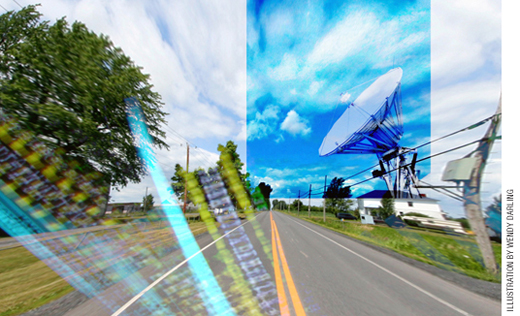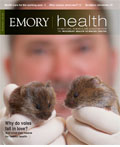Got computer? See doctor

For many people living in a rural area, life can be quiet, peaceful, and uncomplicated.
But when a health crisis strikes, the lack of specialists in the area can make health care challenging. Patients often have to travel dozens or even hundreds of miles to see a specialist in a large city for treatment and follow-up. But in Georgia, that may not always be necessary, thanks to a new development.
The nonprofit Georgia Partnership for Telehealth allows patients in rural areas to seek specialized care close to home. The organization contracts with medical practices and hospital systems throughout Georgia. The hospitals, including those in Emory Healthcare, provide a range of specialists that connect virtually with patients.
Patients go to a medical office in their area. Both the local office and the Emory office are equipped with computer cameras with live video. The patient and the nurse at the local office can see the Emory doctor on their screen. The nurse performs the exam and can move the camera at the doctor’s request. Special equipment allows the doctor to see the heartbeat in the patient’s neck and listen remotely to heartbeats and lungs.
“It’s really everything we could do in the office,” says Rashell Stephenson, the telehealth coordinator for Emory’s Heart and Vascular Center. “One of the biggest benefits is that it reduces health care disparities in rural Georgia. Some people can’t get to Atlanta to see a specialist—they can’t pay for travel or lose the time at work. This lessens the patient’s burden.”
Of the 159 counties in Georgia, 66 lack medical centers and 47 have no acute care hospitals. Emory markets its telehealth services in areas at least 75 miles from Atlanta. The service doesn’t seek to replace the patient’s home physician.
Emory Healthcare offers telehealth services in cardiology, transplant, and geriatric psychiatry. The Emory Transplant Center began using telehealth in 2009 for pre- and post-transplant appointments.
“At first we thought that the younger computer-savvy patients would be the ones who would most like telemedicine,” says Virginia Bowen, nurse manager of the outpatient transplant clinic at Emory University Hospital, “but it turns out that telemedicine has multi-generational interest.” —Kay Torrance


